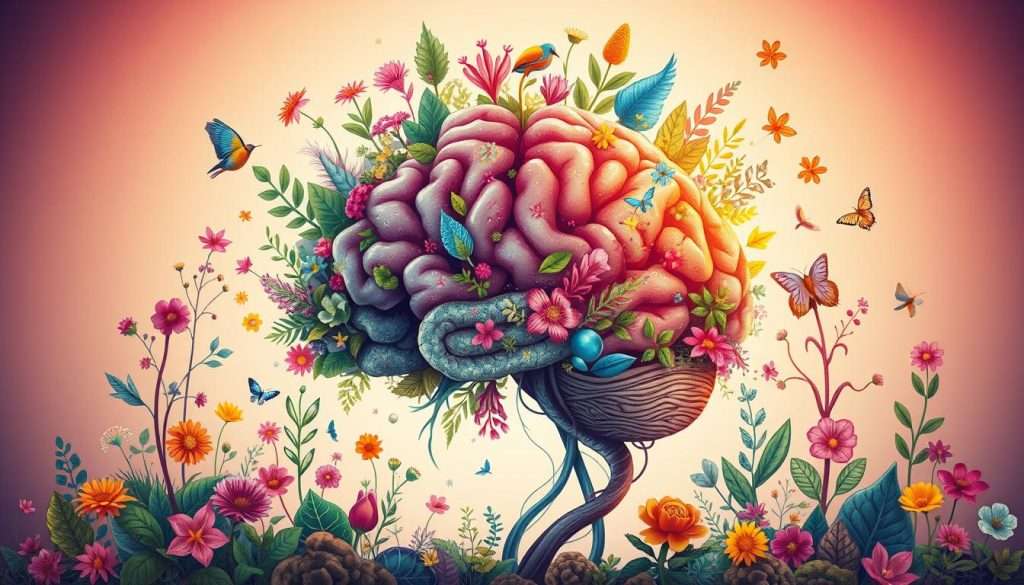Are you ready to unlock your full potential? We all want to be sharper, more focused, and mentally agile. The good news is that improving your brain health is within your reach!
Incorporating healthy habits into your daily life can significantly boost your cognitive function. By making a few simple changes, you can enhance your mental clarity, memory, and overall well-being.
In this article, we’ll explore practical strategies to support your brain health and help you achieve your goals. From simple lifestyle tweaks to effective mental training techniques, we’ll dive into the most effective ways to optimize your brain’s performance.
Key Takeaways
- Discover simple habits to boost your cognitive function
- Learn effective mental training techniques
- Understand the importance of brain health
- Explore practical strategies for mental clarity
- Improve your overall well-being
Understanding Your Brain’s Potential
Your brain can do incredible things, but how do you unlock it? Knowing how your brain works is crucial. It controls everything from movement to memory, and its health affects your well-being.
The Science Behind Cognitive Function
Cognitive function lets your brain process info, remember, and decide. It’s shaped by genetics, lifestyle, and environment. Studies show that certain habits and changes can boost brain health.
Why Brain Health Matters at Every Age
Brain health is vital at any age. For the young, it’s about building strong brain skills. For the older, it’s about keeping those skills sharp. Taking care of your brain improves mental performance and life quality.
| Age Group | Brain Health Focus |
|---|---|
| Children & Young Adults | Developing cognitive foundations |
| Adults | Maintaining cognitive health |
| Older Adults | Preventing cognitive decline |
By focusing on brain health, you can improve your brain function and mental sharpness. This means making lifestyle changes, doing mental exercises, and using strategies that fit your age and needs.
The Mind-Body Connection
Your health is not just about your body or mind. They are interconnected aspects of your overall well-being. The state of one affects the other, creating a delicate balance. This balance is crucial for optimal functioning.
How Physical Health Impacts Mental Performance
Regular physical activity boosts blood flow to the brain. This can improve cognitive function. Exercise has been shown to enhance memory, improve concentration, and even stimulate the growth of new neurons.
This direct link between physical health and mental performance shows the importance of a healthy lifestyle. It supports brain health.
Physical activity is more than keeping your body fit. It also supports your brain’s function. By adding regular exercise to your daily routine, you improve both physical and mental health.
Nutrition Strategies to Fuel Your Brain
Nutrition is key to brain health, affecting focus and memory. The right foods can enhance brain function, while bad ones can slow it down. So, what should you eat to help your brain?
Brain-Boosting Foods and Nutrients
Certain nutrients are vital for brain health. For example, omega-3 fatty acids are essential for brain function.
Essential Fatty Acids and Brain Function
Omega-3 fatty acids, like EPA and DHA, are crucial for brain cells. Foods high in omega-3s include fatty fish, nuts, and seeds.
Antioxidants and Cognitive Protection
Antioxidants protect the brain from damage. Berries, leafy greens, and other fruits and vegetables are full of antioxidants.
Dietary Patterns for Optimal Cognitive Function
Choosing the right diet can greatly improve brain health. Let’s look at two effective diets.
The Mediterranean Diet Approach
The Mediterranean diet is rich in fruits, vegetables, whole grains, and healthy fats. It supports cognitive health.
Intermittent Fasting Benefits
Intermittent fasting boosts cognitive function. It promotes autophagy, where your body recycles damaged cells and proteins.
| Dietary Pattern | Key Components | Cognitive Benefits |
|---|---|---|
| Mediterranean Diet | Fruits, Vegetables, Whole Grains, Healthy Fats | Supports Cognitive Health, Reduces Cognitive Decline |
| Intermittent Fasting | Alternating Periods of Eating and Fasting | Improves Cognitive Function, Promotes Autophagy |
By adding these nutrition strategies to your daily routine, you can significantly boost your brain power. This supports overall cognitive health.
Physical Exercise: Your Brain’s Best Friend
Boosting brain power often means forgetting about a key tool: physical exercise. It’s not just for your body; it’s also great for your brain.
How Movement Enhances Neural Connections
Exercise gets blood flowing to your brain, helping new connections grow. This is called neuroplasticity. It’s key for learning and remembering things.
Optimal Exercise Types for Cognitive Benefits
There are many exercises that help your brain. Let’s look at some of the best ones:
Aerobic Exercise Recommendations
Aerobic activities like running, cycling, or swimming are great. They improve heart health and brain function. Try to do at least 150 minutes a week.
Strength Training for Brain Health
Strength training does more than build muscle. It also helps your brain stay healthy by adapting to new challenges.
Balance and Coordination Activities
Exercises that test your balance and coordination, like tai chi or dance, are good. They make you focus and improve your brain function.
Mixing different exercises into your routine can greatly improve your brain health. So, pick activities you like and do them often!
Sleep: The Ultimate Brain Restoration Tool
Sleep is more than just resting. It’s a time when our brain works hard to fix itself. It helps us remember things better and gets rid of harmful stuff. This is key for keeping our brain sharp and healthy.
The Science of Sleep and Memory Consolidation
Sleep is crucial for our memory. Studies show that when we sleep deeply, our brain goes over memories. This makes learning and remembering easier. Quality sleep is essential for cognitive restoration, making it a critical part of our daily routine.
Creating the Perfect Sleep Environment
To get the most out of sleep, we need a good sleep space. This means a cool, dark, quiet room and a comfy mattress. Doing this can help us sleep better and feel more alert.
Sleep Hygiene Practices for Mental Clarity
Optimal Sleep Duration and Quality
Adults usually need 7-9 hours of sleep each night. Going to bed and waking up at the same time helps. Also, avoiding caffeine before bed can make sleep better.
Managing Sleep Disruptions
To deal with sleep problems, try relaxation techniques like deep breathing or meditation. By focusing on sleep and healthy habits, we can use sleep for brain restoration and mental clarity.
Stress Management Techniques to Protect Brain Function
Chronic stress can harm your brain health. The right techniques can help. Stress triggers your body’s “fight or flight” response, releasing cortisol. This keeps your body alert, affecting your brain function.
How Chronic Stress Damages Your Brain
Chronic stress changes your brain’s structure and function. It impacts emotional regulation and memory. It also harms your brain’s ability to adapt, known as neuroplasticity. Effective stress management can protect your brain.
Mindfulness and Meditation Practices
Mindfulness and meditation reduce stress and boost cognitive function. They focus on the present moment, often through deep breathing or guided imagery.
Guided Meditation for Beginners
Guided meditation is perfect for beginners. It follows a guide through a meditation practice. You can find guided meditations online or through apps for mindfulness and relaxation.
Mindful Awareness Throughout the Day
Mindfulness isn’t just for meditation. It’s about being aware of your thoughts, feelings, and physical sensations all day. This helps you stay focused, even when stressed.
Breathing Exercises for Immediate Stress Relief
Breathing exercises are great for stress relief. They calm your nervous system and reduce anxiety. Try diaphragmatic breathing daily to improve your brain function and well-being.>

By using these stress management techniques daily, you can protect your brain health and well-being.
Help Your Brain Help You: Practical Daily Habits
Creating daily habits that boost brain health can greatly improve your thinking and productivity. Simple routines can sharpen your mind, keep you focused, and help your brain recover.
Morning Routines for Mental Sharpness
Starting your day right can make you mentally clear. Hydration and movement are key to a brain-boosting morning.
Hydration and Brain Function
Drinking water first thing wakes up your brain after sleep. It starts your thinking processes. Even a little dehydration can hurt your focus and memory.
Morning Movement Rituals
Doing physical activity in the morning, like yoga or a walk, boosts brain blood flow. It makes you think better and sets a good day tone.
Workday Strategies for Sustained Focus
To stay productive at work, you need to support your brain. One good way is to make your work area better.
Environment Optimization for Productivity
A good workspace has few distractions, good light, and a comfy temperature. These things help you stay focused.
| Productivity Tip | Benefit |
|---|---|
| Minimize distractions | Improved focus |
| Good lighting | Reduced eye strain |
| Comfortable temperature | Enhanced comfort |
Evening Practices for Cognitive Recovery
Ending your day right is as important as starting it. Relaxation and getting ready for sleep are key to brain recovery.
By following these daily habits, you can greatly improve your brain health. This boosts your productivity and thinking. It’s all about small changes that make a big impact.
Mental Exercises to Strengthen Cognitive Skills
To keep your brain sharp, challenge it with mental exercises. These activities improve cognitive function and build cognitive reserve. Adding brain training to your daily routine boosts mental performance.
Brain Training Activities That Actually Work
Several brain training activities can enhance cognitive skills. These include:
- Memory-Enhancing Games and Practices: Activities like memory matching games, memory matrix, and recall exercises can help improve memory.
- Problem-Solving Challenges: Engaging in puzzles, brain teasers, and strategy games can enhance problem-solving skills.
Memory-Enhancing Games and Practices
Memory-enhancing games and practices test and improve your ability to recall information. Examples include memory matching games and memory matrix.
Problem-Solving Challenges
Problem-solving challenges, such as Sudoku, crosswords, and logic grid puzzles, are excellent for enhancing your critical thinking and analytical skills.
Learning New Skills as Cognitive Exercise
Learning new skills is another effective way to challenge your brain and improve cognitive function. This can include:
- Language Learning Benefits: Acquiring a new language can stimulate areas of the brain associated with memory, attention, and problem-solving.
- Musical Training Effects on Brain Function: Learning to play a musical instrument can enhance cognitive abilities, including memory, spatial-temporal skills, and language development.
- Language Learning Benefits: Acquiring a new language can stimulate areas of the brain associated with memory, attention, and problem-solving.
- Musical Training Effects on Brain Function: Learning to play a musical instrument can enhance cognitive abilities, including memory, spatial-temporal skills, and language development.
Language Learning Benefits
Learning a new language is a complex task that challenges your brain in multiple ways. It requires understanding new grammar rules, vocabulary, and syntax, which can improve cognitive flexibility and memory.
Musical Training Effects on Brain Function
Musical training has been shown to have a positive impact on brain function, improving areas related to memory, spatial-temporal skills, and language development. It requires coordination between different senses and can enhance cognitive reserve.
By incorporating these mental exercises into your daily routine, you can strengthen your cognitive skills and potentially build a reserve that can help protect against cognitive decline.
Social Connections and Brain Health
Our brains do best when we have strong, meaningful social connections. It’s not just about being friendly. It’s key for our brain health.
How Relationships Impact Cognitive Function
Studies show that people with strong social networks have better brain function. They also face less risk of brain decline. This is because social interactions keep our brains active and sharp.
Building a Social Network for Mental Wellness
Creating a strong social network takes effort, but it’s good for our mental health. Here are some tips:
- Join clubs or groups that match your interests.
- Volunteer in your community.
- Regularly stay in touch with family and friends.
Quality vs. Quantity in Social Interactions
It’s not just about having many friends. The quality of those relationships matters more. Meaningful conversations and deep connections are better for our brain health than shallow talks.
Meaningful Conversations as Brain Exercise
Having deep conversations is like mental exercise. It challenges our brains and keeps them sharp.
| Activity | Impact on Brain Health |
|---|---|
| Meaningful Conversations | Improves cognitive function |
| Socializing with Friends | Reduces stress |
| Joining Clubs or Groups | Enhances mental wellness |

By focusing on building strong, meaningful social connections, we can greatly improve our brain health and mental wellness.
Digital Detox: Protecting Your Brain in the Information Age
Digital technology has changed how we live, making it key to balance tech use and brain health. Our devices are now central to work, fun, and staying in touch. But too much screen time can harm our minds, causing tiredness, less focus, and other problems.
The Impact of Digital Overload on Cognitive Function
Too much tech can overwhelm our brains, making it tough to focus and think clearly.Digital overload can lead to:
- Mental fatigue
- Decreased productivity
- Increased stress levels
To fight these issues, we need better ways to use technology.
Strategies for Healthy Technology Use
Creating healthy tech habits can boost our brain power.
Setting Boundaries with Devices means having tech-free zones and times, like during meals or before bed.
Setting Boundaries with Devices
Having tech-free areas and times helps our brains relax. For example, a tech-free bedroom can help you sleep better.
Digital Minimalism Practices
Digital minimalism is about simplifying our digital lives. It means cutting down on apps, stopping unwanted notifications, and using social media less.This helps us focus on what’s important and have better conversations.
| Benefits | Before Digital Detox | After Digital Detox |
|---|---|---|
| Focus | Poor concentration | Improved attention span |
| Mental Clarity | Frequent mental fog | Enhanced mental clarity |
| Stress Levels | High stress | Reduced stress |
By using these tips, we can keep our brains healthy in the digital world. It helps us find a good balance between tech and our mental well-being.
Brain Wellness Strategies for Long-term Health
Embracing brain wellness strategies can greatly improve our long-term health and quality of life. By focusing on prevention and adopting habits that support brain health, we can fight off cognitive decline.
Preventative Approaches for Cognitive Decline
Preventing cognitive decline requires a multi-faceted approach. It’s important to engage in activities that challenge the brain and build cognitive reserve.
Cognitive Reserve Building Activities
- Learning new skills or hobbies
- Engaging in puzzles and brain games
- Participating in social activities
Neuroplasticity Throughout Life
Neuroplasticity, the brain’s ability to adapt and change, is vital for long-term brain health. By continually challenging our brains, we support this adaptability.
Brain Health Optimization Habits That Compound Over Time
Consistency is crucial for brain health. Simple habits, when practiced regularly, can have a significant impact over time.
| Habit | Benefits |
|---|---|
| Regular Exercise | Improves blood flow to the brain, boosting cognitive function |
| Mediterranean Diet | Rich in antioxidants and healthy fats, supporting brain health |
| Adequate Sleep | Essential for memory consolidation and cognitive recovery |
By incorporating these habits into our daily lives, we can support our brain wellness and promote long-term health. It’s about making informed choices that benefit our brain health over time.
Conclusion: Unlocking Your Brain’s Full Potential
We’ve looked at ways to boost your brain health and thinking skills. By adding these habits to your daily life, you’re working towards unlocking your brain’s full power. This means eating right, staying active, and managing stress.
As you start these healthy habits, you’ll see better mental focus and brain function. It’s important to keep your body and mind in balance. This helps you think clearly and stay healthy.
By changing your lifestyle, you’re improving your brain’s abilities and your health for the future. Start using these tips today. See how they can make a difference in your thinking and life quality.

